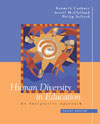

 Human Diversity in Education: An Integrative Approach, 4/e Assessing Progress: The Importance of Social Class and Social Status Multiple Choice |
 2003 McGraw-Hill Higher Education
2003 McGraw-Hill Higher EducationAny use is subject to the Terms of Use and Privacy Policy.
McGraw-Hill Higher Education is one of the many fine businesses of The McGraw-Hill Companies.